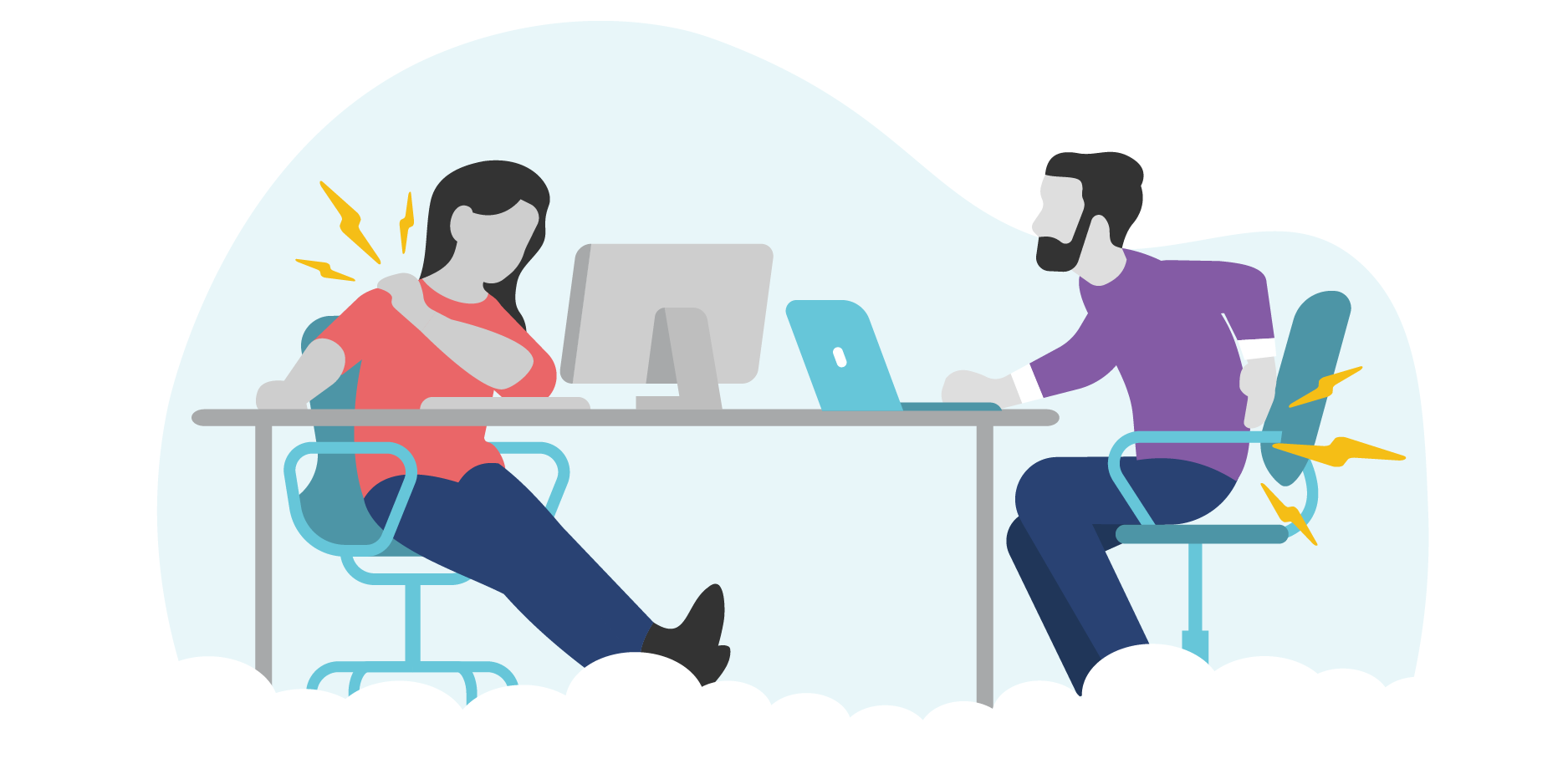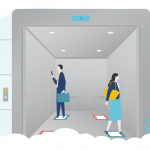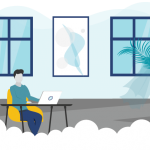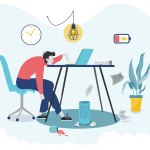The Hidden Cost of Office Work
May 23, 2023

When it comes to critical illness or disability, most people jump to the worst-case scenario: a horrific accident, a sudden and severe diagnosis, an incurable disease—you get the picture. But the truth is, the most common causes of sickness are actually back pain, stress, and fatigue. And the real worst-case scenario? Not being able to work, pay your bills, or provide for yourself or your family.

Believe it or not: the occupational demands of working a long-term desk job put you at risk of developing chronic pain, a life-altering illness, or a permanent disability. Here’s why:
1. Sitting is the new smoking.
It’s well-known that years of static posturing and sitting at a desk can take a toll on your body. Discomfort, fatigue, reduced blood flow circulation, and chronic pain are just the tip of the iceberg when it comes to health issues caused by sitting for extended periods.
Medical research shows that the long-term effects of prolonged sitting have a direct impact on metabolism and increase the risk of cancer, diabetes, obesity, and heart disease, all of which are leading causes of disability concern. Continuous stress on your shoulders, arms, and spine can aggravate existing conditions and lead to stiffness, soreness, hypertension, and other lifelong, debilitating musculoskeletal disorders.
2. A lack of ergonomic support makes things worse.
When the pandemic started, employees suddenly went from working in the office every day to working remotely. As a result, many were forced to make do with whatever home workstation they could throw together on short notice. But in this haste, ergonomic supports weren’t always top of mind, especially for those who don’t have the funds, time, or physical space in their home to make comfortable upgrades.
A lack of proper ergonomics in your office setup can exacerbate the existing issues that arise from sitting for long periods of time. Without the right desk support, once-healthy workers can develop poor posture habits that lead to back, shoulder, and joint pain, tension headaches, stiffness, repetitive stress injuries, and other debilitating conditions over time.
RELATED: Life Insurance Doesn’t Have to Be a Lifelong Commitment—Here’s Why
3. It’s all in your hands.
Carpal tunnel syndrome and cubital tunnel syndrome are relatively common among office workers who spend their days typing on a computer keyboard, using a mouse, and leaning elbows on a desk or armrest.
Strenuous, repetitive hand motions can lead to numbness, tingling, severe cramping, muscle spasms, and loss of manual dexterity over time—and these symptoms may linger even with surgical intervention. If diagnosis and treatment are delayed, carpal tunnel syndrome can potentially cause permanent nerve damage and/or disability.
RELATED: Plan A: Never get seriously ill in your life. Plan B: Panic?
4. Stress, fatigue, and burnout can affect the body.
Office jobs, especially those in knowledge-based fields, typically come with the constant mental strain of completing project after project, trying to meet tight deadlines, multi-tasking, and managing interpersonal relationships. Factor in the stressors of your personal life on top of the stressors of work, and it’s no wonder that many employees are familiar with feelings of fatigue and burnout.
In addition to causing mental and emotional exhaustion, fatigue and burnout can also impact your physical health. It’s not uncommon for people to carry stress in their bodies, leading to physical symptoms such as:
- Headaches or migraines;
- Muscle tension and pain (back, neck, chest, etc.);
- Increased heart rate or heart palpitations;
- Lack of energy, dizziness, or fainting;
- Stomach issues (indigestion, nausea, diarrhea, etc.);
- Changes in appetite, causing weight loss or gain;
- Skin issues (acne, rashes, hives, etc.);
- Insomnia or other sleep pattern disruptions;
- A weakened immune system, causing a higher susceptibility to illness and infections.
If left untreated, these physical symptoms have the potential to become chronic and lead to health problems that can hinder your ability to work and earn a living.
RELATED: Work, Sleep, Eat, Repeat: Managing the Burnout Crisis
5. The pandemic has left long-lasting impacts on our health.
After a few years of limited access to public spaces and spending more time at home than ever before, the average office worker has become less active and less social overall, and this continued isolation can have a significant impact on the body and mind. Even as many social distancing restrictions have been lifted, it’s unlikely that most people with pre-existing pain or newly developed health conditions will be able to return to their pre-pandemic state.
Some of the lasting effects of the pandemic include reduced levels of physical activity, heightened health anxiety, increased social isolation, and years of healthcare backlogs (e.g. delayed non-urgent appointments and treatments) that may have exacerbated existing health conditions. Over time, these factors have resulted in increased rates of chronic pain, mental health issues, and other health concerns, such as the potential long-term side effects of contracting COVID-19.
How can you protect yourself?
Persistent, lifelong pain or a serious illness can leave you unable to work safely and effectively. That means you’ll either have to scale back your responsibilities, put your career on hold, or stop working altogether.
That’s where health insurance comes in. If you’re unable to work because of a serious physical injury or ailment—whether it’s temporary or permanent, Disability Insurance will provide you with anywhere from 60-85% of your monthly income tax-free up until you start working again or retire.
Alternatively, if you’re diagnosed with a critical illness or injury, Critical Illness Insurance will provide you with a one-time, tax-free lump sum that can be leveraged in whatever way best suits your needs. Plus, it’s still paid even if you recover enough to work again and has no impact on any other benefits you might be receiving (like Health & Dental or Disability Insurance).
With Disability and Critical Illness Insurance, you can protect your finances and recover on your own terms without worrying about your next paycheck.
RELATED: How “free” is Canadian healthcare?
When should you start thinking about insurance?
While there’s no age or health status cut-off to buy health insurance, the younger you are, the more you’ll get out of your plan.
Why? Because your premium rate and chances of being approved for coverage depend on your health and age at the time you apply. Younger and healthier individuals are considered lower risk by insurance companies, and are therefore given access to lower premiums and better coverage.
The older you are, the more likely you are to develop a life-changing health condition. That means you’ll be considered higher risk—resulting in less coverage and a higher premium. But if you sign up for insurance when you’re younger and healthier, you’ll have access to a comprehensive, customizable, long-term protection plan at a reasonable cost.
As an office worker, you face the real potential of developing chronic pain, a life-altering illness, or a permanent disability. Now that we’ve highlighted the most common health risks surrounding office work, why wait to invest in Critical Illness and Disability Insurance? Although you can’t predict the future, you can take proactive steps to ensure the financial security of you and your loved ones, just in case you ever find yourself unable to work.
To discuss your unique needs and learn more about the options available to you, connect with PROLINK today!
PROLINK’s blog posts are general in nature. They do not take into account your personal objectives or financial situation and are not a substitute for professional advice. The specific terms of your policy will always apply. We bear no responsibility for the accuracy, legality, or timeliness of any external content.




